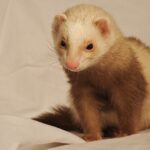Can Ferrets Eat Bacon?
Bacon is a popular food item that many humans enjoy, but can it be safely consumed by our furry friends, specifically ferrets? Unfortunately, the answer is no. While some pet owners might be tempted to share this tasty treat with their ferrets, it’s important to understand the potential dangers and health concerns associated with feeding bacon to ferrets.
The Dangers of Feeding Bacon to Ferrets
Bacon can pose several risks to the health of these small carnivores. Firstly, bacon is high in fat, which can be problematic for ferrets. Their digestive systems are not designed to handle fatty foods, and consuming bacon can lead to stomach upset, diarrhea, and even more serious conditions such as pancreatitis.
In addition to its high fat content, bacon is often cured and contains additives such as salt, nitrates, and preservatives. These ingredients can be harmful to ferrets, as their bodies are not able to process them effectively. Salt, in particular, can lead to dehydration and kidney problems in ferrets.
Potential Symptoms or Reactions
If a ferret consumes bacon, they may experience various symptoms or reactions. These can include gastrointestinal distress, such as vomiting and diarrhea, as well as discomfort and lethargy. In more severe cases, the consumption of bacon can lead to pancreatitis, which is a painful inflammation of the pancreas that requires immediate veterinary attention.
Safe Food Alternatives for Ferrets
Instead of feeding bacon to your ferret, there are several safer options you can consider. Ferrets are strict carnivores, so their diet should primarily consist of high-quality meat-based foods specifically formulated for ferrets. This can include commercially available ferret diets or fresh, raw meats such as chicken, turkey, or beef.
You can also provide your ferret with small portions of cooked eggs or small amounts of cooked, boneless chicken as occasional treats. It’s important to remember that any new food introduced to your ferret’s diet should be done gradually, and any changes should be monitored for any adverse reactions.
Tips for Preventing Access to Bacon
Preventing your ferret from accessing bacon is essential for their safety and well-being. Here are some tips to help you keep bacon away from your curious ferret:
- Store bacon securely: Keep bacon packages and leftovers in securely sealed containers or in areas that are inaccessible to your ferret.
- Dispose of bacon properly: Ensure that any leftover bacon or grease is promptly and safely disposed of in a manner that your ferret cannot reach.
- Educate family members and visitors: Make sure everyone in your household is aware of the risks associated with feeding bacon to ferrets and understands the importance of not sharing this food with them.
Conclusion
In conclusion, while bacon might be a delicious treat for humans, it is not suitable for ferrets. The high fat content, added ingredients, and potential risks outweigh any potential benefits. As responsible pet owners, it is our duty to prioritize the health and well-being of our furry companions. Stick to a balanced diet of appropriate ferret foods and treats, and always consult with a veterinarian for any specific dietary concerns or questions.






